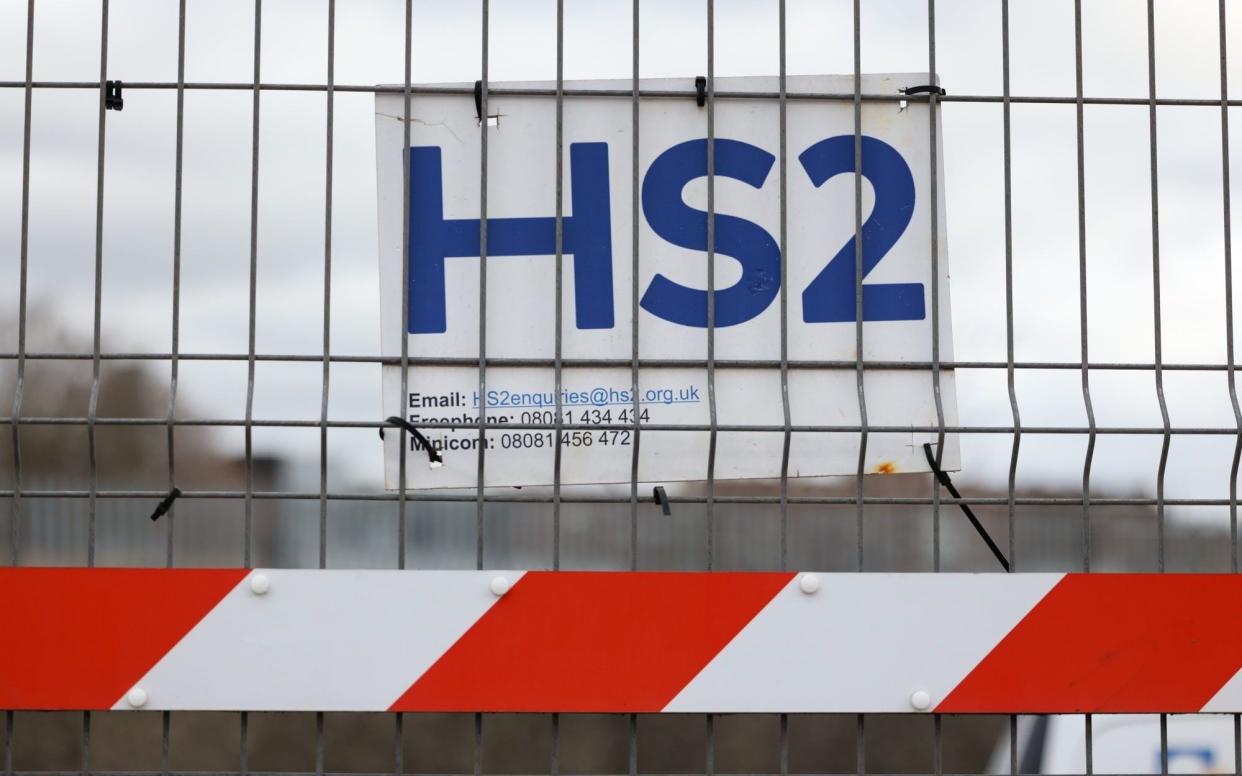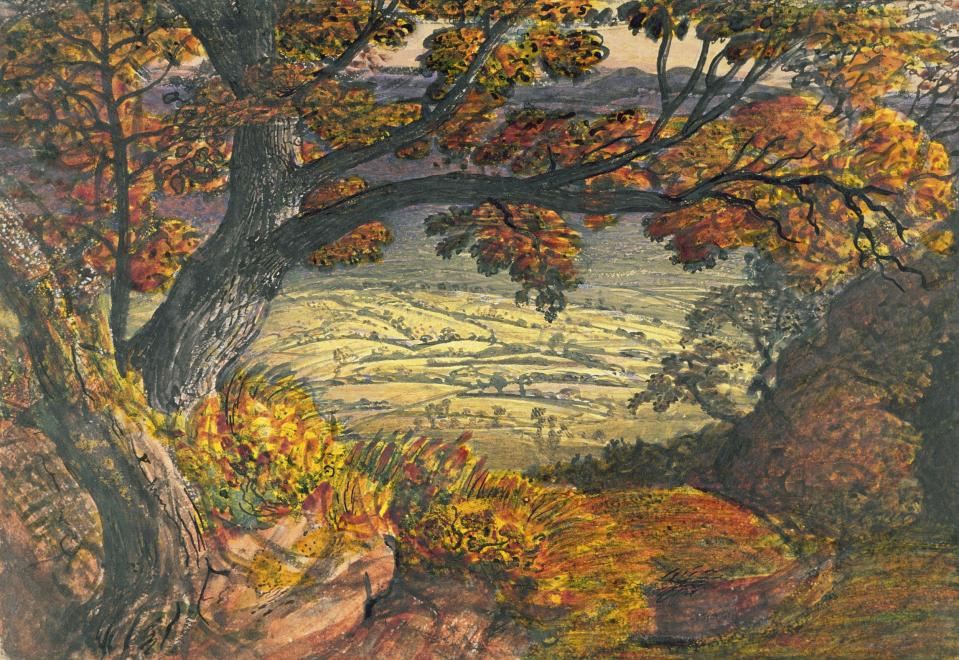Letters: No amount of special pleading can conceal the fact that HS2 has failed

- Oops!Something went wrong.Please try again later.
SIR – Richard Thorp, director of the High Speed Rail Group (Letters, February 10), discusses the rising costs of HS2. He is correct that chopping and changing on any project is likely to have this effect. However, it is also well-known that projects fail because of poor initial design, scoping, justification and costing.
These are the real reasons for the current state of HS2.
Gareth Halliwell
Marcross, Glamorgan
SIR – Alan Stanley (Letters, February 10) asks where the Government thinks it could find the money for restoring our neglected Armed Forces.
Well, it could start by binning the HS2 project, for which there is little or no support from the public, whatever Richard Thorp says. His arguments do not persuade me to support this white elephant.
Alan Skennerton
Bracknell, Berkshire
SIR – Ben Marlow’s analysis is flawed.
A decade ago I sat in Manchester’s council chamber to debate progress on this project. We concluded that it would take several governments and prime ministers for HS2 to become a reality. So far, it is on its sixth occupant of Downing Street.
However, let us not, as a country, lose our nerve over its completion now. Mr Marlow focuses purely on reduced journey times, but increasing capacity on the existing network is equally important. This would allow more freight to travel by rail, reduce congestion and allow stations on the West Coast mainline currently bypassed in the interests of speed to offer more services. It will also provide much-needed competition for Avanti, the present operator.
HS2 supports thousands of well-paid jobs. The employees and businesses involved are taxpayers, and the multiplier effect and impact on local economies should be built into the analysis, too. Infrastructure projects like this are exactly what is needed to keep the country moving.
Cllr Andrew Simcock (Lab)
Manchester
SIR – Sir Jon Thompson, the new chairman of HS2, should look more carefully at the historical record before claiming that the project “shares the same vision of Victorian pioneers who first built our railways” or invoking the spirit of “a new generation of Brunels”.
Two examples will suffice. Powers to construct the first London and Birmingham Railway were granted in 1833; engineered by Robert Stephenson, it was completed in 1838. Isambard Kingdom Brunel’s Great Western line from London to Bristol was authorised in 1835, and it opened in 1841.
Today, by contrast, it is admitted that 20 years are likely to have elapsed before HS2 opens even partially, at some vaguely projected date between 2029 and 2033.
Yet, during the 20 years from the opening of the Liverpool and Manchester Railway in 1830 to the end of 1850, the Victorians had constructed an essentially complete national network, with 6,617 miles of track, extending from Plymouth to Aberdeen. All this was done at private risk, without state involvement. Taxpayers were liable for nothing.
Richard Sharp
Glanton, Northumberland
SIR – I would not scrap HS2. Instead, I would look at replacing its 240 mph, power-greedy trains with more modest sets, such as the 140 mph Blue Javelins running on HS1 from St Pancras into Kent.
They are designed for HS1’s long tunnels and for fast commuting from east Kent. If introduced beyond Crewe, they could also replace Northern Powerhouse Rail – whatever that means – with a scheme that does what it says on the tin: a Northern Cities Crossrail.
Michael Wand
Strategic adviser, HS1 route team, 1990-1993
Brentwood, Essex
Jets to Ukraine
SIR – Much is being made of providing Ukraine with modern combat aircraft (Letters, February 10). While the proposal is laudable, it will be neither straightforward nor quick to achieve, even if the aircraft are readily to hand.
I was responsible for the support services required by the Jaguar fighter, bomber and recce fleet before and during the first Gulf conflict. I had 85 aircraft, of which perhaps 60 could be made available at once. A dozen aircraft were prepared and modified with items immediately at hand. These were launched to Cyprus from RAF Coltishall in three days and thence via Oman to Bahrain, supported by a ground cadre crew to maintain them.
Further and deeper improvements were made over several weeks and, despite losing two aircraft and their pilots, another dozen were made ready, and the initial 12 brought home, with air and ground crews also being swapped. Further improvements were made in preparation for a later swap, but the conflict was fought before this could take place.
The Jaguar is a highly flexible aircraft, but sending it to fight in an unfamiliar climate, using new weapons and employing very different tactics, resulted in surprises. Not something to be entered into lightly.
Colin Cummings
Yelvertoft, Northamptonshire
Raab’s conduct
SIR – You report on the allegations of bullying made against Dominic Raab by an anonymous civil servant.
“Hard staring”? Shocking behaviour by a boss. “Raising his voice”? Unimaginably traumatic. “Long silences”? Practically criminal.
Could I suggest that the person who gave this account considers taking a sabbatical from their Civil Service post and spending six months in the private sector? I doubt they would last long.
Ian McNicholas
Ebbw Vale, Monmouthshire
No death penalty
SIR – I studied law at university in the 1970s. Capital punishment had been abolished some years earlier and replaced by life imprisonment.
The legal test for someone being guilty of murder beyond reasonable doubt had flaws, and serious miscarriages of justice had taken place. Examples included the executions of Timothy Evans and Derek Bentley.
Before politicians such as Lee Anderson, the new Conservative deputy chairman, start mouthing off about the subject, may I politely suggest they avail themselves of some professional criminal legal advice? The risk of getting it wrong is simply too great.
Kim Potter
Lambourn, Berkshire
SIR – Lee Anderson is a man of the people and not afraid to speak his mind, especially on the question of whether capital punishment should be reinstated for the most serious crimes.
I know that if one my children had been murdered by Dennis Nilsen or Peter Sutcliffe I couldn’t have lived with the thought that the state was keeping such people alive and safe at my expense.
Mina Bowater
Blandford Forum, Dorset
SIR – Lee Anderson points out that no executed person has ever committed another crime. He may wish to ponder the fact that no innocent person executed ever came back to life either.
David Platts
Newark, Nottinghamshire
SIR – Mr Anderson is a breath of fresh air. One does not need to support all of his views, but he exposes the idiocy of our present “please all of the people all of the time” style of politics.
V C Cockburn
Bishop’s Castle, Shropshire
Genius of Bacharach
SIR – I have closely followed popular music from a very young age. At seven, I was entranced by Bobbie Gentry’s British number one, I’ll Never Fall in Love Again, composed by Burt Bacharach and the lyricist Hal David.
During the second lockdown in 2021, I taught myself to play the keyboard and learnt many of Bacharach’s greatest songs, such as Raindrops Keep Fallin’ on My Head and Walk On By. These relatively simple yet beautiful melodies encouraged me to practise for hours, and I am eternally grateful to Bacharach for helping me achieve a lifelong ambition.
Philip Duly
Haslemere, Surrey
This Kentish gem must be handled with care

SIR – While I am pleased that Annabelle Thorpe enjoyed her exploration of the Weald of Kent, her bucolic descriptions were at odds with the experiences of many of us who live and work in the area.
She writes of the Weald as “this unspoilt swathe of Kentish countryside” with “every village … picture-book pretty”. Yet the planning environment we currently endure has ensured over the last 12 years that most villages have had massive new housing developments of largely inappropriate scale foisted on them, in many cases by out-of-area inspectors who have overturned the decisions of local planning authorities on grounds that are either unfathomable or contradictory.
It is also worth noting that the High Weald, which enjoys Area of Natural Beauty status, is surrounded by a horseshoe of low Weald, which has no such protection.
The Weald, taken as a whole, is a remarkable patchwork of villages, farmsteads and homesteads where man has lived and made his living alongside tracts of semi-ancient woodland (Weald comes from the German Wald or forest) for centuries. Unless it is given the protection from unsympathetic development that it needs, within the next 20 years it will no longer be recognisable as the gem it undoubtedly is.
Peregrine Massey
President, Weald of Kent Protection Society
Woodchurch, Kent
Casual theatregoers
SIR – I recently went to the theatre to watch a ballet performance with my grown-up granddaughter.
I observed that, 50 years ago, members of the audience would have been wearing their Sunday best (Letters, February 10) – and then had to explain what Sunday best was.
Margaret Reed
Trowbridge, Wiltshire
Colourless cars
SIR – The preponderance of grey or similarly coloured cars in Britain (Letters, February 10) is largely down to the manufacturers or the dealers, who charge more for any colour that is not standard.
My husband and I have red cars of different makes because, when we bought them, the standard colour for both was red and it would have cost us hundreds of pounds more to have any other. I would have preferred a green car, but red gets me from A to B.
Rosemary J Wells
Weymouth, Dorset
SIR – Amid the constant procession of greyish cars on today’s roads, it is a joy and a comfort to see the occasional supercar painted a distinctive bright orange.
Drabness has not quite prevailed.
Neil Sewell-Rutter
Oxford
SIR – It is possible that some of the “grey” cars on our roads only appear to be so.
Here in Cornwall, most of our vehicles are grey, since they are heavily dusted with grime. Unlike the rest of the country, Cornwall is still covered by last summer’s hosepipe ban.
Anne Hanley
Gunnislake, Cornwall
SIR – It’s not just cars that are drab nowadays. What happened to our taste for colourful wallpaper, carpets, curtains, china, clothes, railway posters and album covers?
John Wallbridge
Wolverhampton
Letters to the Editor
We accept letters by post, fax and email only. Please include name, address, work and home telephone numbers.
ADDRESS: 111 Buckingham Palace Road, London, SW1W 0DT
FAX: 020 7931 2878
EMAIL: dtletters@telegraph.co.uk
FOLLOW: Telegraph Letters on Twitter @LettersDesk

